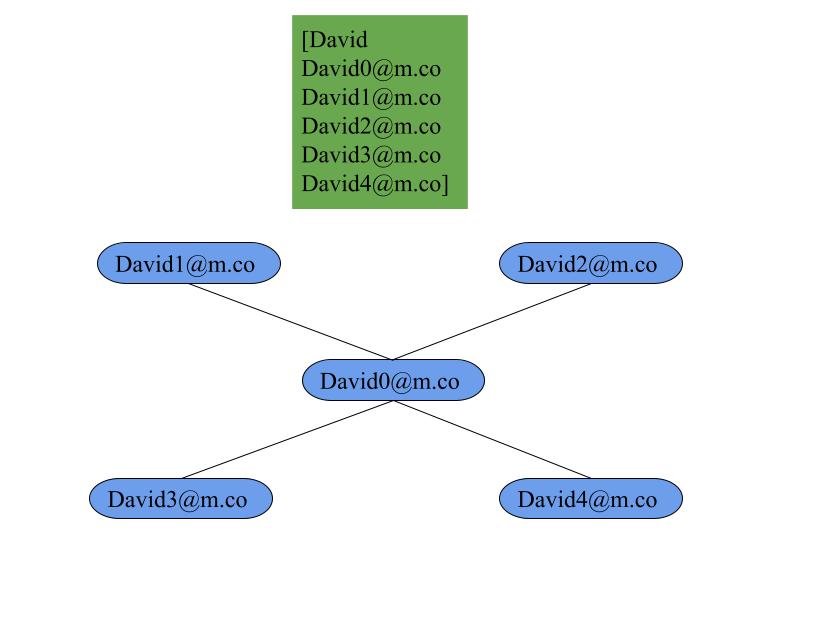Question
Given a list of accounts where each element accounts[i] is a list of strings, where the first element accounts[i][0] is a name, and the rest of the elements are emails representing emails of the account.
Now, we would like to merge these accounts. Two accounts definitely belong to the same person if there is some common email to both accounts. Note that even if two accounts have the same name, they may belong to different people as people could have the same name. A person can have any number of accounts initially, but all of their accounts definitely have the same name.
After merging the accounts, return the accounts in the following format: the first element of each account is the name, and the rest of the elements are emails in sorted order. The accounts themselves can be returned in any order.
Example 1:
Input: accounts = [["John","johnsmith@mail.com","john_newyork@mail.com"],["John","johnsmith@mail.com","john00@mail.com"],["Mary","mary@mail.com"],["John","johnnybravo@mail.com"]]
Output: [["John","john00@mail.com","john_newyork@mail.com","johnsmith@mail.com"],["Mary","mary@mail.com"],["John","johnnybravo@mail.com"]]
Explanation:
The first and second John's are the same person as they have the common email "johnsmith@mail.com".
The third John and Mary are different people as none of their email addresses are used by other accounts.
We could return these lists in any order, for example the answer [['Mary', 'mary@mail.com'], ['John', 'johnnybravo@mail.com'],
['John', 'john00@mail.com', 'john_newyork@mail.com', 'johnsmith@mail.com']] would still be accepted.
Example 2:
Input: accounts = [["Gabe","Gabe0@m.co","Gabe3@m.co","Gabe1@m.co"],["Kevin","Kevin3@m.co","Kevin5@m.co","Kevin0@m.co"],["Ethan","Ethan5@m.co","Ethan4@m.co","Ethan0@m.co"],["Hanzo","Hanzo3@m.co","Hanzo1@m.co","Hanzo0@m.co"],["Fern","Fern5@m.co","Fern1@m.co","Fern0@m.co"]]
Output: [["Ethan","Ethan0@m.co","Ethan4@m.co","Ethan5@m.co"],["Gabe","Gabe0@m.co","Gabe1@m.co","Gabe3@m.co"],["Hanzo","Hanzo0@m.co","Hanzo1@m.co","Hanzo3@m.co"],["Kevin","Kevin0@m.co","Kevin3@m.co","Kevin5@m.co"],["Fern","Fern0@m.co","Fern1@m.co","Fern5@m.co"]]
Constraints:
1 <= accounts.length <= 10002 <= accounts[i].length <= 101 <= accounts[i][j].length <= 30accounts[i][0]consists of English letters.accounts[i][j] (for j > 0)is a valid email.
Algorithm
A list of email, names cannot be used to determine if they belong to the same user, only if they have email convergence.
So for each person we need to find his/her all emails, so when looping emails if there are convergence in difference list, we merge them
Use a graph to model .
do we really need that many edges to keep track of which emails belong to the same account? No, as long as two emails are connected by a path of edges, we know they belong to the same account. So instead of creating a complete subgraph for each account, we can create an acyclic graph using only K−1K - 1K−1 edges. Recall that K−1K - 1K−1 is the minimum number of edges required to connect KKK nodes. In this approach, we will connect emails in an account in a star manner with the first email as the internal node of the star and all other emails as the leaves (as shown below).

- Build adjacency list for the firstEmail in an account with other emails in the account
- Traverse over accounts , if visited, skip; otherwise DFS
- During DFS, add each email to the mergedAccount, and mark visited
- After DFS, sort the mergedAccount and make the accountName first element
- Store mergedAccount to mergedAccounts (the final result list)
The official editorial gives a detail intuition : https://leetcode.com/problems/accounts-merge/editorial
Implementation
class Solution { HashSet<String> visited = new HashSet<>(); Map<String, List<String>> adjacent = new HashMap<String, List<String>>(); public List<List<String>> accountsMerge(List<List<String>> accounts) { int accountListSize = accounts.size(); for (List<String> account : accounts) { int accountSize = account.size(); String accountFirstEmail = account.get(1); for (int j = 2; j < accountSize; j++) { String accountEmail = account.get(j); if (!adjacent.containsKey(accountFirstEmail)) { adjacent.put(accountFirstEmail, new ArrayList<>()); } adjacent.get(accountFirstEmail).add(accountEmail); if (!adjacent.containsKey(accountEmail)) { adjacent.put(accountEmail, new ArrayList<>()); } adjacent.get(accountEmail).add(accountFirstEmail); } } List<List<String>> mergedAccounts = new ArrayList<>(); for (List<String> account : accounts) { String accountName = account.get(0); String accountFirstEmail = account.get(1); if (!visited.contains(accountFirstEmail)) { List<String> mergedAccount = new ArrayList<>(); mergedAccount.add(accountName); DFS(mergedAccount, accountFirstEmail); Collections.sort(mergedAccount.subList(1, mergedAccount.size())); mergedAccounts.add(mergedAccount); } } return mergedAccounts; } private void DFS(List<String> mergedAccount, String email) { visited.add(email); mergedAccount.add(email); if (!adjacent.containsKey(email)) { return; } for (String neighbor : adjacent.get(email)) { if (!visited.contains(neighbor)) { DFS(mergedAccount, neighbor); } } } }